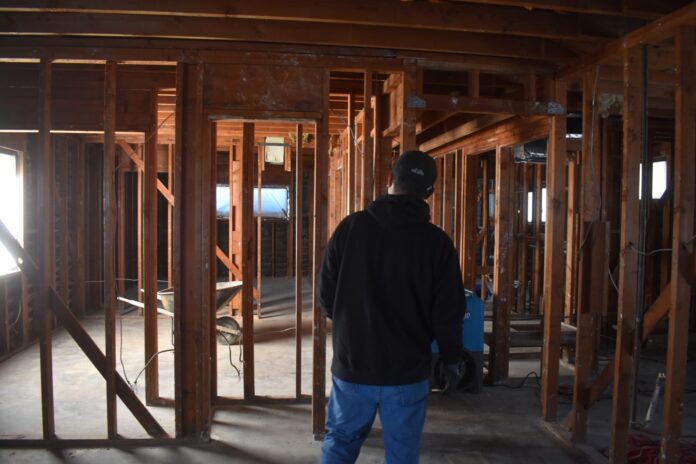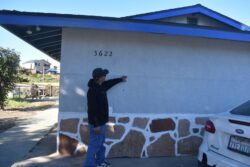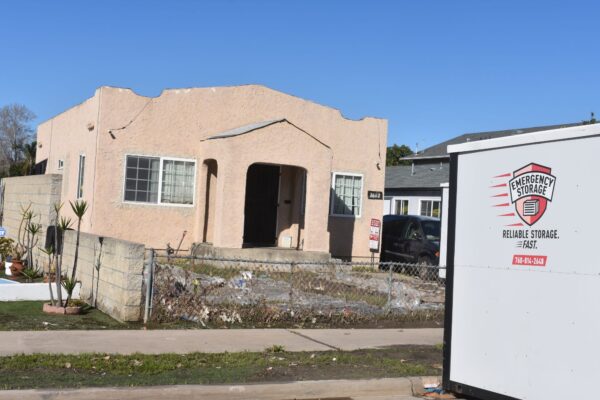
By Macy Meinhardt, Voice & Viewpoint Staff Writer
Homeowners who experienced flooding are grappling with a whirlwind of challenges right now. From daunting cleanup efforts to navigating insurance claims, stable housing, and governmental funding. All while balancing familial responsibilities and work obligations.
Amidst all of that, it’s been reported that alleged “vulture investors” are canvassing hard-hit neighborhoods in Southeastern San Diego, offering overwhelmed homeowners a low-price for their home in exchange to wash their hands of their property.
“As a community, we must shine the light on grieving San Diego flood victims, and the vulture entities shamelessly preying on their current vulnerabilities,” wrote in a social media post by San Diego Rise Up, a non-partisan citizens advocacy group.
The post highlighted a video captured by volunteers on Beta St., which features an altercation unfolding with a real estate representative in the Southcrest neighborhood.
“These people have been here for three, four generations at least, and it’s hard to have someone come in and just try to, you know, say ‘hey we want your house,’” said Reinette Senum, alongside Melissa Grace, Founder of SD Rise Up.
According to witnesses, the agent speaking back in the video is allegedly from PorchLight Realty, a local regional real estate agency serving San Diego. However, PorchLight Realty denies that the man in the video, despite wearing the company shirt, works for the company.
What is disaster investment?
A home disaster investor seeks to profit from opportunities arising from disasters that impact homes, such as floods, fires, or hurricanes. Mostly they come in a few days after the disaster, offering residents an on the spot cash deal and contract, then ultimately re-selling or flipping the damaged home for a higher profit.
Furthermore, the neighborhoods reportedly hit the hardest by the floods–Encanto, Shelltown, Southcrest, Mountain View—are also recognized as regional points with: “generations of underinvestment and injustices” that have led to “increased vulnerability in the impacted communities.” as stated in a City Staff Report. Arguably, making these areas a prime target for what opponents call a “predatory practice.”
“Uninsured property owners who are victims of these disasters almost always are forced to sell because the cost to rebuild is too exorbitant,” said Anthony Sanfilippo, author of “The Rise of the Disaster Investor”.
However, not the Gomez family. Residing on the end of Beta street next to the Southcrest Community Park, Ruben Gomez watched in horror as his childhood home that has been in the family for six generations became swallowed by five-feet of water–with his elderly parents inside of it.
“The water was up to their chin, they called me and told me they were dying before the line cut off,” said Gomez as he recalls the moments before his parents were rescued by emergency services.
Miguel and Martha Gomez have been respected members of the Southcrest Community and have resided in their Beta St. Residence for 60 years. Once rescued, they were admitted to a hospital where they both suffered hypothermia. In addition, his mom took bacteria filled flood water into her lungs, resulting in lung infection that has since required the aid of an oxygen tank.

Ruben’s parents are now back from the hospital and staying with their son. Despite facing upwards of $150,000 in recovery damages, the Gomez family asserts, their home that has been passed within the family for six generations is indeed, not for sale.

Meanwhile, two doors down from the Gomez residence, one property owner who also sustained catastrophic water damage said a real estate investor allegedly offered them $100,000, and had a prepared contract on the spot. This offer stands out as significantly below market value, especially considering that Redfin estimates the median listing price for homes in the Southcrest neighborhood to be around $700,000.

In an online post published by Laila Aziz, who has been a prominent presence with the Southeastern Response Team, writes that developers have been out offering people food, and then offering home appraisals for free.
“The sharks are out” she writes. “Stay safe folks, they are coming for your homes. They are offering landlords a way out to regentrify our community,” said in a social media post.
According to a report in the Wall Street Journal “the vulture playbook is pretty straightforward: Investors approach affected homeowners with an offer just days after tragedy strikes, hand them a prewritten contract, and try to reach an agreement on the spot. Once acquired, the investors turn around and resell the land for a higher price — sometimes without ever repairing the property.”
In the video uploaded onto Instagram by SD Rise up, the scene of this very practice comes into play.
“It is just really insensitive,” said Melissa Grace.
The realty associate in the video, replies:
“ I know it is insensitive, but at the same time I also think that there are some people who have a property like this and can’t live here anymore , and what are they going to do with it?”
“And what are you going to do with it?” she replied.
“We have a team, we repair the properties and then we rent them out.”
The man continues to say: “People need money, and somebody is going to be interested whether it’s us or the city.”
“ I have been here working, and I am listening to their heartbreaking stories, and it’s really pompous of you to come over here like this,” said CEO and founder Melissa Grace.
“The neighbors don’t want you here,” Melissa Grace asserts.
“I appreciate your guys’ time” the man in the video said, as it came to an end.
With reports that over a 1000 buildings, homes, and businesses were impacted by flooding, it appears that this kind of real estate practice was doomed to occur as it already has been reportedly “on the rise.”
“The practice is becoming increasingly common as the number of natural disasters climbs in the U.S,” the Wall Street Journal reported. In 2023, the United States experienced 28 separate weather or climate disasters that each resulted in at least $1 billion in damages.
It will be a long road to recovery for affected flood victims. But amidst the chaos, voices rise in defiance, echoing the sentiment that these neighborhoods are not commodities to be bought and sold at a discount.



